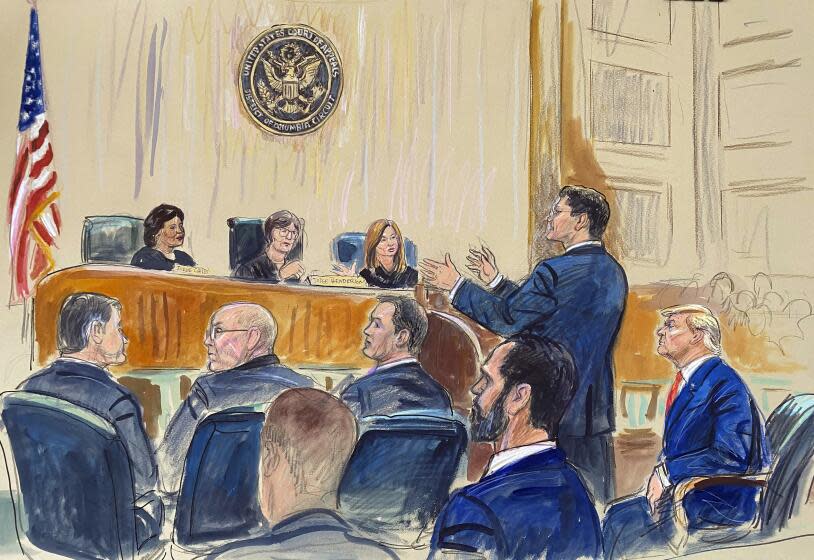Opinion: Trump's attempt to intimidate a federal appeals court could ensure his defeat

- Oops!Something went wrong.Please try again later.
- Oops!Something went wrong.Please try again later.
- Oops!Something went wrong.Please try again later.
During arguments Tuesday, a panel of the U.S. Court of Appeals for the D.C. Circuit expressed appropriate skepticism about Donald Trump's claim of immunity from charges that he attempted to overturn the 2020 election. But what happened afterward may have been even worse for Trump than the hearing itself: The former president refused to rule out violence if the appeals court’s decision goes against him, as he appears to think it will.
“It’ll be bedlam in the country,” Trump told reporters. “It's the opening of a Pandora's box.”
To many, that sounded like encouraging lawlessness.
Because such dangerous behavior has become almost commonplace with Trump, some of us have come to tune it out. But it's a safe bet that the courts won't.
Read more: Opinion: This surprise argument could derail Trump's immunity claim in the Jan. 6 trial
It’s hard to imagine anything more damaging to one's prospects in a case than attempting to intimidate the judges considering it.
In this case, it’s even worse. In real time, Trump was reenacting what special counsel Jack Smith's indictment accused him of doing on Jan. 6, 2021: fomenting violence against the rule of law. And he was targeting the judges entrusted with his case just down the street from their courthouse.
Perhaps it was a knee-jerk retaliatory response from a man who can't stand the thought of being a loser, whether in court or an election. Trump seems unable to tolerate the concept of being constrained by law.
Or it may have been the deliberate strategy that we’ve seen throughout this presidential campaign: drumming up his base to return him to office and give him a get-out-of-jail card.
Read more: Editorial: Trump’s immunity arguments are laughable, unpersuasive — and dangerous to democracy
But polls show that if Trump is convicted of a crime before the election, his prospects of returning to the White House will drop to Earth like the meteor said to have extinguished the dinosaurs. And if he is tried, he is virtually certain to be convicted. The evidence Smith's team has compiled against him is beyond overwhelming.
What he therefore wants to avoid in the coming months is a trial. To do that, he needs the circuit court, and more importantly the Supreme Court, to buy his untenable immunity claim or his even weaker argument that impeaching and criminally trying him for the same offenses would violate the Constitution.
His goal of getting the Supreme Court to consider his claim and delay the trial is not likely to be helped by statements like the one he just made. Judges do not take kindly to defendants who threaten the rule of law, and a barely disguised call for violence is sure to offend every jurist who takes their constitutional role seriously.
Trump probably hurt himself in another way beyond the courtroom: by bolstering one of President Biden's central arguments against him. Just a few days earlier in Valley Forge, Pa., Biden drew a defining contrast with his rival in his first campaign speech of the year.
“Trump won't do what an American president must do," Biden said. "He refuses to denounce political violence. ... I will say what Donald Trump won't: Political violence is never acceptable in the United States — never, never, never. It has no place in the democracy. None.”
We can expect Trump to repeat his calls for violence in the months ahead. And if one thing could dissuade independent and undecided voters from casting their ballots for the former president, it may be encouraging law-breaking and threatening public safety. Trump's mouth could prove to be the Biden campaign's most powerful weapon.
Dennis Aftergut is a former federal prosecutor who is of counsel to Lawyers Defending American Democracy.
This story originally appeared in Los Angeles Times.

